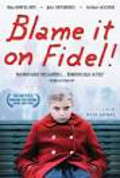
France 2006
Directed by
Julie Gavras
99 minutes
Rated M
Reviewed by
Bernard Hemingway

Blame It On Fidel!
Freely adapted by director Julie Gavras and Arnaud Cathrine from a novel, Tutta Colpa Di Fidel, by Domitilla Calaamai, Blame It On Fidel! is a charming story of the experiences of nine-year-old, Anna de la Mesa (Nina Kervel), in the early 1970s when her conventionally-bourgeois Parisian parents, magazine writer Marie (Julie Depardieu, daughter of Gérard) and Spanish-born lawyer father, Fernando (Stefano Accorsi), suddenly develop a Left-wing consciences and get involved with domestic pro-abortion and pro-Allende movements and radically alter their and Anna’s lives, much to the latter’s discomfit.The story is told from Anna’s point of view and Nina Kervel gives a remarkable performance as the child who strongly resists her parent’s conversion at the same time as trying to understand it. Although with so little attention given to the adult characters at times the film feels a tad thin content-wise and ad-hoc in narrative development, having little more to trade off than Anna’s petulance, the cuteness of her younger brother (Benjamin Feuillet) and some rather pointed messages about the contradictory implications of left-wing idealism. It is nevertheless an engaging take on the subject of children’s experiences adjusting to an adult world and has an authentic feeling for the milieu of '70s political activism.
Gavras has reason to be confident with the material as she is the daughter of celebrated leftist filmmaker, Costa-Gavras, responsible for the classics, Z (1969) and State Of Seige (1972) whose best-known film, Missing (1982), also pertained to the Allende years in Chile.
Want something different?





